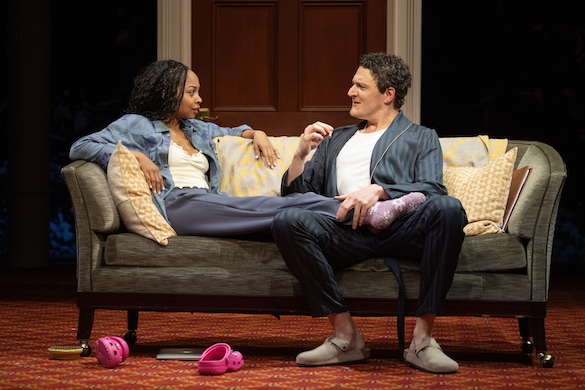With ‘Sally & Tom,’ Suzan-Lori Parks Tackles American History, Adding Plenty of Context
If you haven’t guessed yet, her new work was inspired by the relationship between Thomas Jefferson and Sally Hemings, the enslaved woman he took as his mistress and kept with him until his death some 30 years later.

In Suzan-Lori Parks’s Pulitzer Prize-winning “Topdog/Underdog,” which had an explosive revival on Broadway two years ago, the sole characters are named Lincoln and Booth. In her new play, “Sally & Tom,” the titular figures are also named after a beloved president and a person whose name will be forever linked with his in infamy — though in this case, it’s the president whose actions were, if not homicidal, then highly controversial.
If you haven’t guessed yet, Ms. Parks’s new work was inspired by the relationship between Thomas Jefferson and Sally Hemings, the enslaved woman he took as his mistress when she was a young teenager and kept with him until his death some 30 years later. The play informs us that Jefferson did not even grant Hemings freedom as he lay dying — as George Washington and Benjamin Franklin did for their slaves, we’re told — though he did free the numerous children she bore him.
Ms. Parks knows what you’re thinking: Oy, another play (it could just as well be a movie, or a book) reducing a dead white man who did undeniably great things to his worst transgressions and judging him by standards vastly different than our current ones. “Sally & Tom” acknowledges this dilemma, openly and cleverly, by studying its central duo in a transparently modern context, thus allowing its playwright to nod to — and even have fun with — contemporary mores and hangups without letting historical demons off the hook.
We meet Hemings and Jefferson as characters in a play readying for its first production, written by a young Black woman named Luce, who also portrays Sally, and directed by her white beau, Mike, cast as Tom. The couple are members of a troupe called Good Company, which as Luce drily notes has “a track record of doing angry political plays that nobody comes to.”

Luce’s account of Jefferson and Hemings is ostensibly a step toward making the company’s work more palatable. Originally called “E Pluribus Unum” — the American motto translating to “Out of many, one” — the play is now set to be presented under the cheerier title “The Pursuit of Happiness.” A producer with access to substantial funds, a fellow named Teddy, has been enlisted.
Yet Teddy — whom we never see, though he is referred to repeatedly — has a few lingering issues with Luce’s script; in particular, he’s bothered by a speech that the character of James Hemings, Sally’s brother and Tom’s chef, delivers after being pushed to the brink by his master’s hypocrisy. A brief excerpt: “All them pretty words you write, Mr. Jefferson, they’re all lies! You’ll soon be ashamed by the lies that this country was built on, Mr. Jefferson!”
Shuttling between scenes that follow the actors rehearsing “Pursuit” in the present day and scenes that place their characters in Jefferson’s home in late-18th century Monticello — the back and forth is neatly accommodated by Riccardo Hernández’s spare but handsome set design and Rodrigo Muñoz’s whimsical costumes — Ms. Parks and director Steve H. Broadnax III explore the different reactions provoked by the speech and other elements of Luce’s play, not to mention the backstage drama.
A pair of questions at the core of both plays is whether Hemings loved Jefferson, and if their relationship in any way transcended a gross abuse of power. “This is not a love story,” Luce insists, more than once; speaking with Mike at home, she wonders whether “it was just grooming and then rape and then ‘Stockholm Syndrome.’”
But Sally and Tom are both granted powerful monologues in which their individual stories and the dynamic between them emerge as more complex, and in ways more unsettling. Sally proposes that perhaps her feelings for Tom were those of “a very young woman” who “loves a man who is much older than she is, a man who gives her gifts and privileges.”
While there’s apparently no such age difference between Mike and Luce, parallels with the historical couple inevitably surface. Gabriel Ebert is predictably imposing and affecting as Mike and Tom, evincing an almost chilling imperiousness without making either character come off as heartless or invulnerable. Sheria Irving’s warm but uncompromising Luce complements her more deferential but dignified Sally.
Ms. Parks has specified the race of other performers in Luce’s play, clarifying tensions that develop — some of them comical — but also upending cliches, and reminding us that license can be taken by artists. (The actresses speak of playing women much younger than themselves.) Luce’s friend Maggie and Sally’s sister Mary are both played by a witty Kristolyn Lloyd; Maggie has both a background in Black nationalism and anti-capitalist activism and a wealthy husband. “It’s the only way I can afford to work on your shows,” she tells Luce.
Luce’s ex-boyfriend Kwame, who plays James in “Pursuit,” is more torn about the relative success he has found taking on film and TV roles; Alano Miller brings robust authority and relaxed humor to both roles. There’s also an Asian-American character, Scout, who juggles the smaller part of Tom’s younger daughter, Polly, with those of stage manager, dance captain, and all-around gofer.
When Scout, played by a pert Sun Mee Chomet, declares at one point that she yearns “to stand in the light,” she’s referring to more than just a desire for bigger roles. If “Sally & Tom” showcases Ms. Parks’s inherent optimism far more than “Topdog” did, it also paints, in clear and concise strokes, an unfinished struggle for a more perfect union.

